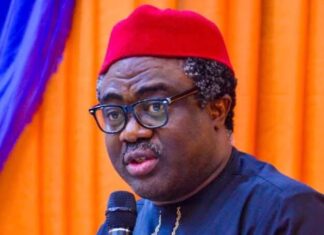Power Minister, Chinedu Nebo, made a curious demand on President-elect Muhammadu Buhari on Wednesday, May 6 which we find hard to understand let alone accept if only because the power sector privatisation has distributed more darkness nationwide than light.
Nebo told reporters after the weekly Federal Executive Council (FEC) meeting in Abuja that Buhari should not reverse the power privatisation policy of President Goodluck Jonathan’s administration.
His reason is rather a threat: Reversing it would be counter-productive with grave consequences.
In Nebo’s words, reversing “the privatisation and liberalisation of power generation, transmission and distribution would set Nigeria back many, many, many decades.”
We disagree.
A week earlier, former Vice President, Atiku Abubakar, had advised Buhari at a Kaduna International Trade Fair seminar organised by the Kaduna Chamber of Commerce, Mines and Agriculture (KADCCIMA) to reverse the current power sector privatisation for Nigeria to move on.
Atiku said the failure of the power sector resulted from successive governments tackling the problem with wrong approaches.
Since the Olusegun Obasanjo administration, extending into the outgoing Jonathan’s, power has guzzled up billions of foreign currency which went into private pockets in the face of erratic supply for which consumers pay bloated estimated bills.
The government’s explanation for poor power supply is the same old in different stanza: Nebo says some demon-possessed Nigerians are frustrating the effort at making power available.
He argues that the National Integrated Power Projects (NIPPs) have the capacity to provide 5,500 megawatts (mw) but it is hampered by vandals who damage gas pipelines to frustrate its supply to power plants.
Jonathan did his best – which was not good enough – when he launched the Roadmap on Power in 2010, after five years of inactivity since the enactment of the Electric Power Sector Reform Act of 2005.
The roadmap envisaged the privatisation and handing over the unbundled Power Holding Corporation of Nigeria (PHCN) to 18 electricity generating companies (GenCos) and distribution companies (DisCos) to private owners, which the government did on November 1, 2013.
The handover was widely acclaimed as one of the most transparent power privatisation exercises in Africa.
EPSRA also provides for the development of a competitive electricity market, and the establishment of a Nigerian Electricity Regulatory Commission (NERC) to oversee and monitor the industry, among others.
Since then, only complaints were heard about the transfer of management and financing by the private owners. Their demands from the government for funds drew the first complaints from the public.
The Central Bank of Nigeria (CBN) Intervention Fund released N213 billion as loan to the industry to offset legacy gas and power debts as well as shortfalls in the Interim Rule Period (IRP).
Failure to install metres in homes and offices as the government ordered several times without compliance or sanction, while they issue estimated “crazy bills” which without stable power worsened the complaints against the private suppliers.
Now, the government boasts of installing extra capacity to generate 5,500mw, but the vandals make grid power supply hover around 3,800mw about three weeks to the handover on May 29, taking the country once more into the pre-Jonathan Presidency.
For the good news, all the 10 abandoned NIPPs have been completed, bringing additional 4,700mw to the grid. Electricity transmission lines increased by 4,550km in 2010 to 15,760km in 2015, and transmission substations went up from 121 to 162, with 122 more under construction.
In addition, there is the 700mw Zungeru hydro power project, the 3,050mw Mambilla hydro power project and the 215mw Kaduna thermal power plant, among others being built.
The first coal-to-power plant at Itobe, Kogi State is also under construction, all of which will minimise dependence on gas for generation and its pipeline vandals, though gas will continue to be flared wastefully in the fields, causing health problems.
A healthy mix of energy sources for NIPP generating plants gives good potential prospects for boosting power supply in the immediate future if the transmission and distribution problems will also be solved in tandem.
Reports from other climes say the power companies have monopoly to import power equipment like transformers into their countries. Any individual who imports them gets them confiscated by the Customs at the port of entry.
If there is no market, nobody will vandalise installed equipment for resale to Gencos and Discos.
We recommend to the incoming government to ignore Nebo’s advice.
Instead, it should hire consultants to examine generating, transmission and distribution companies, toothcomb their bid papers to be sure they have both the financial and technical competence to operate efficiently and profitably.
The suspicion is high that the Jonathan government privatised these companies to its cronies and confederates for political patronage and we know that the beneficiaries are nothing but drainpipes on the federal treasury. If any is not competent to operate profitably, reversing its privatisation and paying the owners off is recommended.
But no wholesale reversal is necessary or worth the effort since Egbin power, for example, invested N50 billion recently to boost capacity by 220mw.
Ughelli power plant has raised capacity from 160mw to 610mw, and plans to hit 1,000mw soon. Kainji’s capacity rose from 80mw to 230mw, aims at 470mw, while Jebba rose from 450mw to 546mw.
Soon, they will be competing with micro-independent power projects (IPPs) such as the 10.6mw Alausa power project in Lagos, which powers the state secretariat, and Obafemi Awolowo Way, executed through public private partnership (PPP) with Oando Gas and Fidelity Bank.














